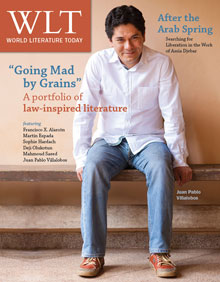Speech Lessons by John Montague
Winston-Salem, North Carolina. Wake Forest University Press. 2012. ISBN 9781930630598
 Speech Lessons exhibits all the lyrical grace of John Montague’s previous volumes without ever slipping into easy nostalgia. His poems of memory do not simply look backward into a personal past but are woven into the fabric of history and, sometimes, mindful of what is to come (the volume ends with “the future, already whirling past”). Although he is known for his evocations of childhood, of family and community, and of Ireland’s difficult twentieth-century history, these themes inform one another so that we view the personal through the communal, and the singular self is poignantly present but never egotistical or self-enclosed. This is what gives Montague’s work its broad scope.
Speech Lessons exhibits all the lyrical grace of John Montague’s previous volumes without ever slipping into easy nostalgia. His poems of memory do not simply look backward into a personal past but are woven into the fabric of history and, sometimes, mindful of what is to come (the volume ends with “the future, already whirling past”). Although he is known for his evocations of childhood, of family and community, and of Ireland’s difficult twentieth-century history, these themes inform one another so that we view the personal through the communal, and the singular self is poignantly present but never egotistical or self-enclosed. This is what gives Montague’s work its broad scope.
He is known as a stylist, and rightly so. Speech Lessons exhibits Montague’s care for the stanza form: each poem has its own stanzaic form, which is often disrupted to great effect, as when the poem suddenly offers a surprising final impression, a change of speaker, or unforeseen burst of feeling. Montague is a master of measure and melody, establishing regular cadences and irregular but noticeable patterns of rhymes: harmonies are often formed by echoes across lines and across stanzas. He is a poet who embraces form but not undue stricture. This is one facet of Montague’s talent for making his material fresh, both sonically and thematically, and avoiding predictability. Such intricate poems reward careful reading yet do not sound ponderous. Their nostalgia is not cloying; their elegies are multidimensional, not simply adulatory; the poet’s visionary metaphors are never outlandish; the humor is gentle and intermittent. In short, these are poems that give pleasure. Their well-crafted surfaces delight the ear and eye to such a degree that it is almost imperative to reread them as soon as one has finished.
Speech Lessons makes new and extended use of the Bible. It also summons several past masters: Keats, Blake, Eliot, Auden, and MacNeice are audible beneath the verse. Yet these weighty intertexts are often used almost improvisationally, in a spirit of serious play. The variations of reference, tone, and diction in Speech Lessons are remarkable: we travel from the Muldoonian playfulness of “clickety-click, lickety-split” to the gravity of “Silences,” wherein poetry is “a prayer before an unknown altar, / a spell to bless the silence.”
John Montague succeeds in creating poems that are both lyrical and narrative, in which the history of Ireland (“our still unresolved republic of pain”) intertwines with personal and familial memory. This is a great gift, and one on full display here.
Magdalena Kay
University of Victoria, British Columbia

